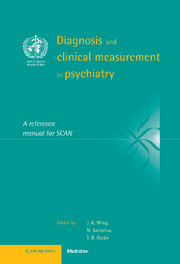Book contents
- Frontmatter
- Contents
- List of authors and SCAN Advisory Committee
- Preface
- Acknowledgements
- 1 Measurement and classification in psychiatry
- 2 The PSE tradition and its continuation in SCAN
- 3 Aims and structure of SCAN
- 4 The SCAN Glossary and principles of the interview
- 5 SCAN translation
- 6 Technical procedures
- 7 Training in the use of SCAN
- 8 International field trials: SCAN-0
- 9 SCAN-1: Algorithms and CAPSE-1
- 10 Development of SCAN-2.1
- 11 Computerisation of SCAN-2.1: CAPSE-2
- 12 Clinical, educational and scientific uses
- Subject index
2 - The PSE tradition and its continuation in SCAN
Published online by Cambridge University Press: 05 August 2016
- Frontmatter
- Contents
- List of authors and SCAN Advisory Committee
- Preface
- Acknowledgements
- 1 Measurement and classification in psychiatry
- 2 The PSE tradition and its continuation in SCAN
- 3 Aims and structure of SCAN
- 4 The SCAN Glossary and principles of the interview
- 5 SCAN translation
- 6 Technical procedures
- 7 Training in the use of SCAN
- 8 International field trials: SCAN-0
- 9 SCAN-1: Algorithms and CAPSE-1
- 10 Development of SCAN-2.1
- 11 Computerisation of SCAN-2.1: CAPSE-2
- 12 Clinical, educational and scientific uses
- Subject index
Summary
Introduction
It was suggested in Chapter 1 that disease concepts evolve over time. When mature (which is not to say immutable), they are states of somatic and psychological dysfunction attributable to a known pathogenesis, with a known pattern of recognition, course and outcome in the absence of modifying factors. The effects of the physical, social and psychological environment in causation, treatment and care are also known. Few disease concepts have reached the end of this evolution. Most psychiatric complaints are still in the early stages, so much so that ICD terminology refers to them only as ‘disorders’. To make a ‘psychiatric diagnosis’, therefore, is to hypothesise, on the basis of incomplete information (as a minimum an observable pattern of symptoms and signs), that further knowledge will become available through the usual pattern of scientific research and clinical observation.
The more clearly symptoms are described, and the more precisely the rules for grouping them into syndromes are specified, the more comparable will be tests of hypotheses of all kinds. Validity, in terms of a demonstrable and replicable relationship to some independent criterion, can sometimes be demonstrated even when the manifestations are diverse and variable, but it would not be sensible to rely only on that chance. This is why it is necessary, not only to use the set of classifying rules in ICD-10, but also to provide for international use a set of differential definitions for each of the symptoms specified and for many that are not specified. It will be possible to apply other sets of rules as well, and to compare the results of hypothesis testing. Scientific examination of diagnostic concepts will then be possible in psychiatry as in other branches of medicine.
The history of the PSE
The development of a set of instruments intended to serve these purposes was made necessary by the research that had been undertaken in the Social Psychiatry Research Unit of the UK Medical Research Council 10 years following its foundation in 1948 (O'Connor, 1968). Several scales were available that quantified the behaviour and, to a lesser extent, the symptomatology of patients (Lorr, 1966; Venables, 1957; Venables and O'Connor, 1959; Wittenborn, 1955). The resulting scores were often analysed statistically in order to produce clinical groupings; for example, ‘perceptual distortion’.
- Type
- Chapter
- Information
- Diagnosis and Clinical Measurement in PsychiatryA Reference Manual for SCAN, pp. 12 - 24Publisher: Cambridge University PressPrint publication year: 1998
- 3
- Cited by



